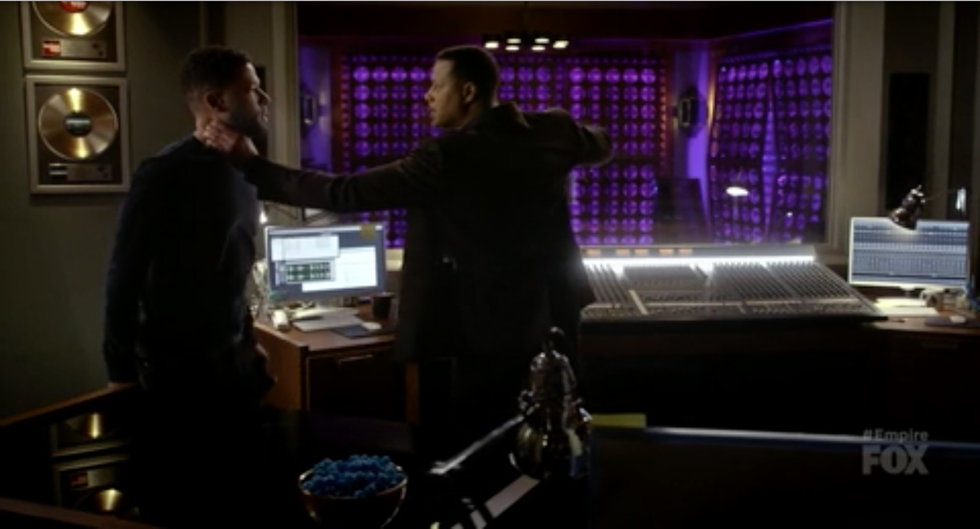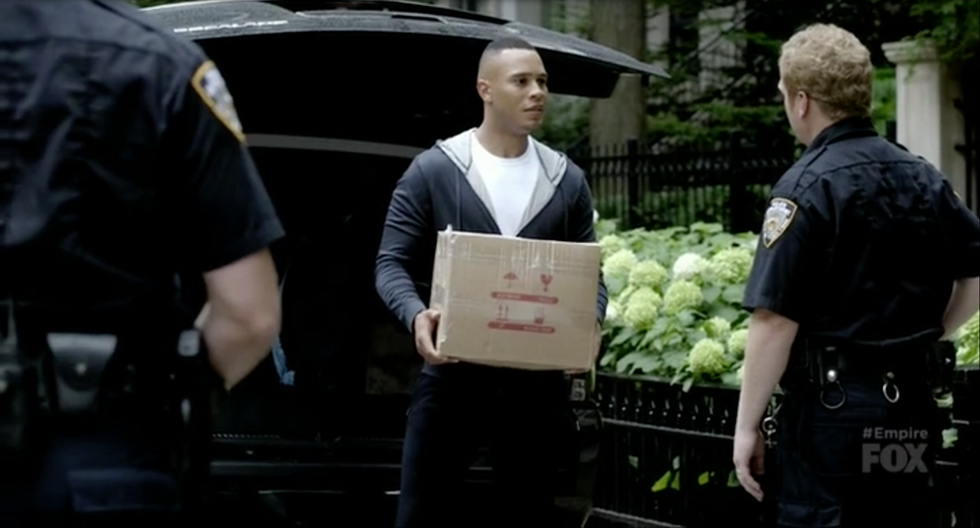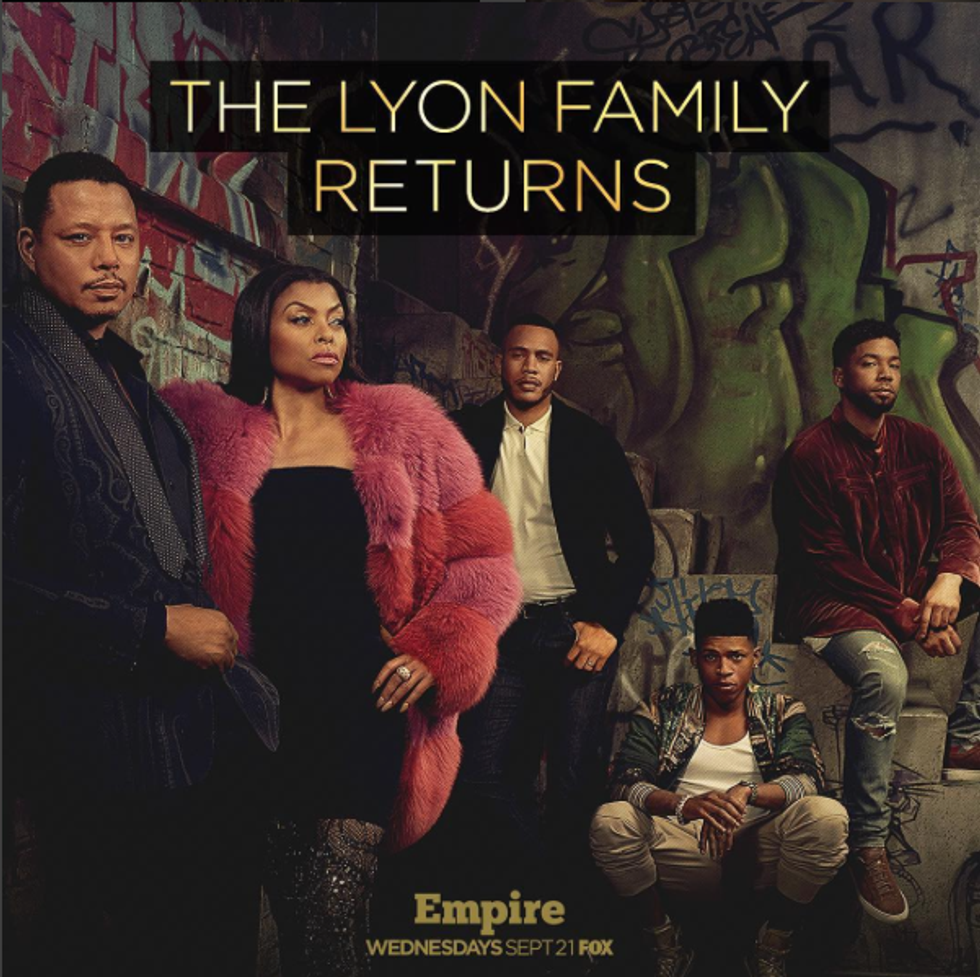Spoiler alert: This piece contains information regarding the show's new season and latest episode. Do not continue reading if you are not briefed on episode 2, Season 3 of 'Empire' and plan to get caught up.
There's something to be said for Fox's music-oriented shows addressing social issues that plague our society. First it was Glee which put common teenage issues at the forefront of primetime TV. The comedy-drama did not stop at the typical teen pregnancy, drug abuse, etc. Glee dealt with matters that were very much alive at the time it aired, going as far as addressing the selfish act of texting and driving, cyberbullying, suicide attempts, and even school shootings. It spoke to several Post-Millennials, including myself; so much so that I came to view it as the Breakfast Club of my generation. With Glee at its final season, Fox satiated our hunger to relate to our TV programs with a show that would not only come to replace it, but also surpass it in many ways: the hip-hop soap opera Empire.
Empire revolves around the Lyons, "a family dynasty set within the glamorous and sometimes dangerous world of hip-hop music." The show follows the Lyons as they fight over who will rule the family media company, Empire Entertainment: the "king of hip-hop" and founder himself, Lucious Lyon (Terrence Howard); his ex-wife and co-founder Cookie Lyon (Taraji P. Henson); or one of their sons, Andre (Trai Byers), Jamal (Jussie Smollett), and Hakeem (Bryshere "Yazz The Greatest" Gray). However, despite its strong focus on family drama and competition in the music industry, Empire has managed to tackle key issues of social significance, particularly to the African-American community.
The first season saw homosexuality at the center of the show's storyline. Empire began airing in the midst of the landmark Supreme Court case Obergefell v. Hodges, which legalized gay marriage, and it could not have come out at a better time (no pun intended). What is even more significant about the way Empire addresses homosexuality, however, is that it tackles the issue of homophobia in regards to how it is viewed in hip-hop and African-American culture.
Undeniably, there tends to be a belief that these three are incompatible, that there's no such thing as a gay rapper or an homosexual black man. Empire seeks to break this limiting and highly oppressive belief. The show succeeds in accomplishing this by presenting the successful Lyon family, owners of the top hip-hop record label in the music industry. Within this universe, Jamal Lyon, Lucious' middle son and an artist of the label, is a young, closeted, gay man who begins to garner some success for his music. Along with that, comes the pressure from his father to maintain a certain image for the sake of his career in R&B and with Empire. However, Jamal finds it increasingly difficult to hide this part of his identity. Hence, in the eighth episode of the first season, he low-key comes out to the world while performing one of his father's famed songs, which angers the old-school hip-hop mogul. In the following episodes and seasons, they ameliorate their relationship, but Lucious never fully accepts his son's "way of life." His disapproval resurfaces in the seventeenth episode of the show's second season, in which Lucious tells his son: "The day you die from AIDS, I'm going to celebrate." Empire does a phenomenal job of portraying the struggle that some African-American homosexuals and gays in the music industry, notably in the hip-hop and R&B genres, may face.
The show's first season also undertakes spreading awareness about the stigma of mental illness that exists in our society, especially among African-American families.
Again portrayed through one of Lucious' sons, Andre, this issue becomes increasingly significant to the show's plot. Empire addresses mental illness by normalizing the issue in order to de-stigmatize it. In the second episode of Empire's first season, it is revealed that Andre, the eldest of Lucious' son and CFO of the family's media company, was diagnosed with bipolar disorder and has been managing by taking his medications. However, as Empire faces some financial drawbacks and he is pressured by his father to find solutions, Andre puts off taking his meds. The stress of dealing with managing Empire and refusal to take his medications will later lead to his contemplating suicide in the eighth episode of the first season. Though it first seems to be a one-off problem, the show's second season heavily focuses on Andre's bipolar disorder and its effects on the whole family. In the second season, it is discovered that Lucious' mother is also bipolar and that, therefore, Andre inherited the disorder from her. We also learn that Lucious marginalizes his son because he reminds Lucious of his own mother. Lucious Lyon, once again, acts as a microcosm of the societal norm that oppresses mentally ill African-Americans, as he first refuses to accept his son's illness.
Another issue that Empire starts addressing in its second season is that of systemic racism in the justice system and police brutality.
In the second season, which began airing in the midst of the increasing awareness to police brutality, especially directed at African-Americans, Empire became active in tackling this issue by using its most prominent means of communication: music. The first sign that the show would not stay clear of addressing the subject came in the first episode. Lucious had previously been arrested in the last episode of the first season, so the second season opened with the Lyons hosting a 'Free Lucious' concert. During the fictional concert, the song "Born to Lose" was performed. Featuring Sean Cross, Swizz Beatz, Jussie Smollett (Jamal), and Yazz The Greatest (Hakeem), the song denounced the unfairness in our justice system, specifically the incarceration of innocent black men. A few episodes later, in the fourth episode of the season, Empire makes a bold move in addressing police brutality and responses to that matter. The music video for Jussie and Yazz's song in the episode, "Ain't About the Money," is a clear and undeniable allusion to the Black Panther party; the fictional director for the video even states that it has a "post-apocalyptic Black Panther theme with the brothers fighting police oppression.” The show did not shy away from taking a position on this issue. After boldly asserting its stand, however, Empire took a more low-key stance in the ninth episode with the song "Powerful" featuring Alicia Keys; that was the last we heard of its position in that season. More recently, the show came back for its third season; and as much as the matter of police brutality and gun violence remains an issue in our society, it remains a matter that Empire addresses wholeheartedly. Season three of the show contained the songs "Need Freedom" sung by Jussie Smollett and "Watch Out" by Ezri "Ezzy" Walker which vehemently denounces the problem and offers a solution for African-American teenagers, respectively.
In addition to that, the third episode of the season went as far as involving a major character, Andre, in such a situation. In the last scene of the episode, while moving out of his old house in what seems to be a rich and predominantly white neighborhood, Andre gets questioned by two white police officers about his presence there. Things escalate, meaning the police officers dramatize the whole situation, and Andre finds himself fighting for his rights and maybe even his life. The episode ends with Andre pinned against the floor by the two officers, a gun to his head.
It's great to see a show such as Empire, a show about a successful African-American family, showcase the everyday and very real struggles that blacks from all walks of life still go through in our society. It normalizes these issues and shows the audience that regardless of the Lyons' social status, they are not exempt from oppression, marginalization, and discrimination.
By foregrounding these subjects, Empire does not only act as a PSA for the social issues that plague America, but it also offers a voice to the oppressed. It eliminates the fear that may come with being open about sexuality, the shame some may feel about being mentally ill, or the anger and frustration of seeing our brothers, sisters, friends, fathers, and mothers oppressed, marginalized, and discriminated against. In addition to being known as #EmpireWednesday, every wednesday should now be known as #WokeWednesday on Fox.

























